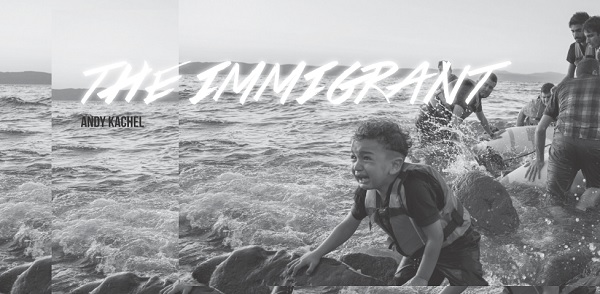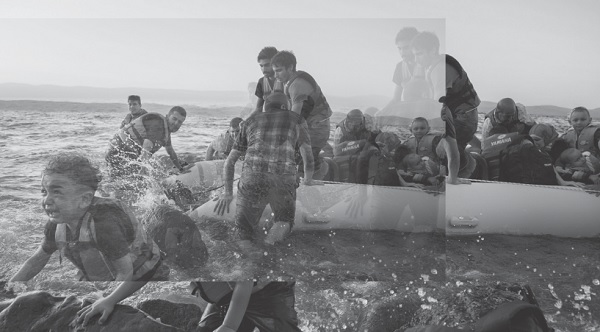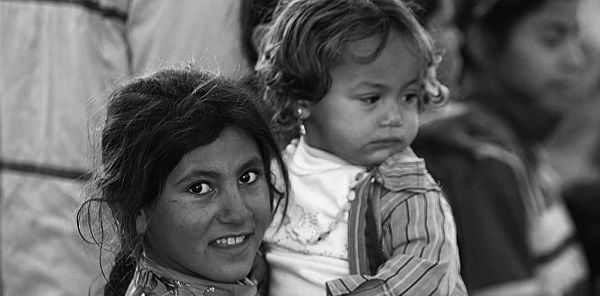The Immigrant
By Andy Kachel

I need you to use your imagination.
You are a soul who stands before the golden gates of heaven. The ethereal border of heaven surrounds you on each side. You have passed on from this life and now wait in a long, winding line to be permitted access to heaven (yep, there is a line for heaven too). On the other side of the wall and beyond the golden gates is the land of milk and honey. Once on the other side, you will never be hungry and will never shed another tear, except for tears of joy.
As you wait outside in line, you take stock of your life. Memories flood back of careers, both good and bad that you've held. You think of your children and the spouse you are leaving behind. You think back on the home and mortgage you had recently finished paying. However, a slight, unnerving itch begins to nag at you. Something you can't control in death has come to mind. Will that life insurance policy pay out? There's no way to tell now.
Before you know it, the line has narrowed and you now stand at the checkpoint. A lone angel, who has a slight look of boredom on his face, is reviewing each soul's credentials in the Book of Life. He's evidently been at this for as long as there've been souls crossing into heaven (luckily for him, a thousand years to your immortal soul is only a year or so for him). You can't quite hear what he's asking each soul, but whatever he’s asking has the power to grant them access to heaven beyond the golden gates.
As you approach, the look of boredom fades from his face and in its place you see a look of bewilderment. "Name?" the angel asks. You give your name, which starts the angel on a frazzled hunt through the Book of Life. He shuffles through the pages faster and faster. "Looks like I'm going to need to make a call upstairs," he states. The angel picks up the handset of a rotary dial phone (Heaven doesn't have smartphones just yet). While the angel is having a muffled conversation, you stand at the gate sweating it out. What could have gone wrong?
The angel returns with an explanation: "I made a call to the Big Man upstairs. Literally, the Guy who wrote the book, and He's saying He never knew you." You plead your case, which is the life you've led. You recount the numerous good deeds you've done, your many great accomplishments, and that time you helped triple your company's sales figures. "That's right," you explain to the angel. "They didn't just double. They tripled!"
The only response you receive: "I'm sorry. He never knew you."

While this story has no basis in Scripture, I hope it illustrates an important mood, one of separation. I find it awfully ironic that one of the biggest issues in America today is immigration, and yet we as Christians have not lent our voices, even though we are foreigners. Consider how immigrants or refugees must feel, especially those from countries like Mexico or Syria, who wait outside our borders for entry. Our voices carry such an important weight on this topic, since the Scriptures tell us that we Christians are "foreigners."1 The journey we will all one day take from this life into death is in every regard a migration. Christians are more aware of this journey than anyone else. Shouldn't we then know the plight and struggle of immigrants better than anyone else?
The United Nations High Commissioner for Refugees (UNHCR) defines a refugee as "someone who has been forced to flee his or her country because of persecution, war, or violence. A refugee has a well-founded fear of persecution for reasons of race, religion, nationality, political opinion or membership in a particular social group."2 Of all refugees worldwide, 54% come from only three countries: Somalia (1.1 million), Afghanistan (2.7 million), and Syria (4.5 million).3
In 2015, President Obama announced his plan to resettle 10,000 Syrian refugees. The New York Times reported in May 2016 that "nearly eight months into an effort to resettle 10,000 Syrian refugees in the United States, Mr. Obama’s administration has admitted just over 2,500." The same article identifies the 2016 election year and anti-immigration legislation as making "it impossible to quickly take in substantially more Syrians by removing any of the tough vetting procedures." While politicians tend to put a spin on all major issues, what's more surprising is how few people the United States planned to take in. Our number is dwarfed in comparison to countries like Turkey (2.5 million), Pakistan (1.6 million), and Lebanon (1.1 million).4 While those countries' numbers seem to be due to proximity, 10,000 refugees seems very narrow.
During this election season, how is it that there is such a great negative sentiment in America towards immigrants from countries experiencing genocide, famine, war, and poverty? While I don't think it is true to say that all Christians are opposed to immigrants, I do fear that we've become apathetic towards the issue primarily due to our wealth-seeking. Apathy should be of great concern because in Scripture, the city of Sodom is charged with apathy. “[Sodom was] arrogant, overfed and unconcerned; they did not help the poor and needy.”5 One of the first claims Christ makes of himself in Scripture is the exact opposite: “The Spirit of the Lord is on me, because he has anointed me to proclaim good news to the poor. He has sent me to proclaim freedom for the prisoners and recovery of sight for the blind, to set the oppressed free.”6
Do we want to be like our Lord in taking up the cause of the oppressed? Or have Christians in our nation shifted their focus so much that their only concern is with building bigger? Jesus tells a parable of a man who accumulated a great wealth in crops and shifted his concern in life to building bigger barns. The parable ends very succinctly, “You fool! This very night your life will be demanded from you. Then who will get what you have prepared for yourself?”7 I can't help but feel that maybe the man in this parable is like the man in my story earlier, only concerned with accumulation and not charity.

Our conversations with our churches on the issue of immigration need to start with a greater awareness of our Christian journey as foreigners in this world. As foreigners in this world, we Christians ought to know better than anyone else what it feels like to long for a better country. At this juncture in history, there are people longing to enter our country. This should cause us to feel compassion towards them and maybe a sense of kinship. Think of the parallels. We now exist in a fallen world with broken relationships, pain, suffering, and endless labor. Not all immigrants, but many live in deplorable conditions and seek a future within our borders. Christ has promised us a heaven free of suffering.8 In America, we enjoy the comforts of freely practicing our religion, access to education and employment, and comforts unheard of in all of history. The parallels are profound.
How can we become more aware of the issue of immigration, especially for immigrants coming from oppressed countries? The average cost for an Immigrant to become a legal citizen is $680.9 However, this cost goes up when you consider the stringent process required to be eligible for citizenship. An immigrant must remain in the country for five years and leave for no longer than six months to be considered eligible.10 Green card filing fees and lawyer fees range in the thousands of dollars. For a church, setting aside part of a tithe as a way to support an immigrant in gaining legal citizenship is a practical way to take up the cause of Christ.
An important next step could be to research and see if your town has immigrants from countries that have been heavily oppressed. Consider what you might do for those families. How could you and your family come alongside them to include them in your community? Are there illegal immigrants in your community? What steps could you and your church take in helping them toward legal citizenship? I believe some of the biggest issues of our day can be solved very practically. However, sometimes practicality means sacrificing our own supply of wealth to aid another. As it is written in James 1:27, "Religion that God our Father accepts as pure and faultless is this: to look after orphans and widows in their distress and to keep oneself from being polluted by the world." If we never share the wealth we have found in this nation with those outside our borders, it will be wasted because we certainly won't be taking it to heaven.
References
1 Hebrews 11:13
2 “What Is a Refugee - USA for UNHCR.” USA for UNHCR. Accessed September 29, 2016. http://www.unrefugees.org/what-is-a-refugee/.
3 “Figures at a Glance.” UNHCR News. Accessed September 29, 2016. http://www.unhcr.org/en-us/figures-at-a-glance.html.
4 Davis, Julie Hirschfeld. “U.S. Struggles With Goal of Admitting 10,000 Syrians.” The New York Times. May 30, 2016. Accessed September 29, 2016. http://www.nytimes.com/2016/05/31/us/politics/as-us-admits-migrants-in-a-trickle-critics-urge-obama-to-pick-up-the-pace.html?_r=3
5 Ezekiel 16:49-50
6 Luke 4:18
7 Luke 12:16-20
8 Revelation 21:4
9 “How Much Does It Cost to Apply for US Citizenship?” US Immigration Blog RSS. Accessed September 29, 2016. https://www.us-immigration.com/blog/how-much-does-it-cost-to-apply-for-us-citizenship.
10 “US Citizenship Apply Guide.” US Citizenship Test Guide. Accessed September 29, 2016. https://uscitizenshiptestguide.com/text/apply.html.


 Andy Kachel is a writer and editor in the Boston, Massachusetts area. Outside of work, he enjoys hiking, perusing the local comic book store, spending time with his wife, and reading.
Andy Kachel is a writer and editor in the Boston, Massachusetts area. Outside of work, he enjoys hiking, perusing the local comic book store, spending time with his wife, and reading.